Tumour threatened teen’s sight before the world’s best experts stepped in to save him
In Victor’s tiny village in Bougainville there is no internet or access to telephones, but a doctor made sure he connected with the world’s best to save his sight.
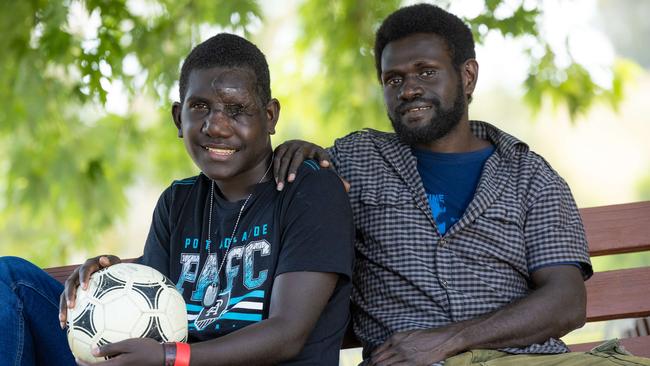
Victoria
Don't miss out on the headlines from Victoria. Followed categories will be added to My News.
Shy, softly spoken Victor Ramei has a simple wish for 2024. The teenager from a small village in Bougainville, Papua New Guinea, wants to just get on with life.
Only a few months ago Victor, 14, did not think a “normal life” would ever be possible but a dedicated group from Victoria and South Australia had other ideas.
Victor was born with an orbital tumour, a wicked web of abnormal tissue invading his left eye that was threatening his sight, possibly even his life.
Once he started school it also stopped the passionate athlete joining in with his friends, particularly in the sports he loved to play: basketball and football.
“I always wish that I could do all things that my peers can do … but can’t because of this swelling covering my eyesight,” Victor said through his cousin Isaac Oliver before the surgery.
“Words cannot express how desperately I long to be well and get on with my life.”
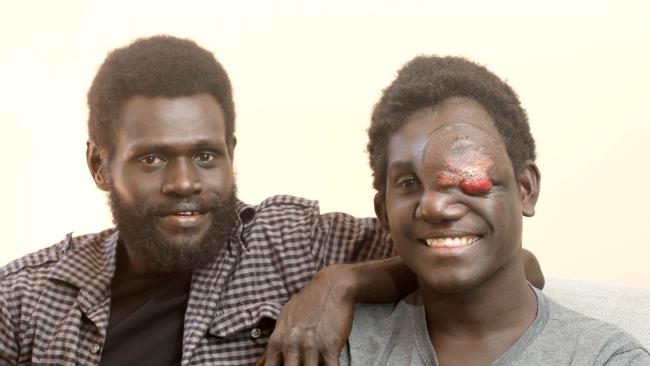
Enter team Victor: medical experts and volunteers in Melbourne and Adelaide led by the renowned Children First Foundation, a Melbourne-based not-for-profit that helped give Victor hope for his future.
Always in Victor’s corner are his close family of four brothers and a sister and his loving parents Rhonda and Robert, along with his cousin Isaac Oliver, who put his own studies on hold to come to Australia last month to be with him as Victor underwent surgery.
Victor does not speak English. Yet.
He says learning the language is on his ever-growing list of things to do when he returns home next week, tumour-free and ready for life.
Victor lives in a village of fewer than 500 people so remote there is no internet or telephone, no means of external communication and certainly no access to the video games that have become Victor’s new passion while recovering from surgery in Adelaide over Christmas.
What will he do without them?
“He might get a little bored,” says Isaac with a chuckle.
In a country where there is no financial support for people living with disability, blindness would have been life-changing.
This was one of the reasons the Children First Foundation agreed to bring Victor and Isaac to Australia for the critical surgery.
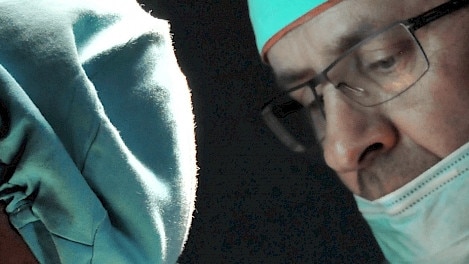
Its chief executive Jessica Redwood says if Victor had gone blind, or worse if it had spread to his brain, it would have grave consequences as there is no social security support in PNG.
“If left untreated, Victor’s future would be very different and he would have been reliant on his family for all his most basic needs, for the rest of his life,” she said.
“Thanks to our donors, the Women’s and Children’s Hospital Adelaide and Ronald McDonald House Adelaide, we are thrilled to be able to support Victor to access the critical life-changing surgery he needed.”
The charity, established in 1999, helps to bring children to hospitals across the world including Australia. Each year it supports lifesaving and life-changing surgery for about 33 children with operable conditions who cannot be treated in their home countries.
Victor was brought to its attention by Damien Hasola, a dedicated doctor in Port Moresby, who first operated on him as a five-year-old.
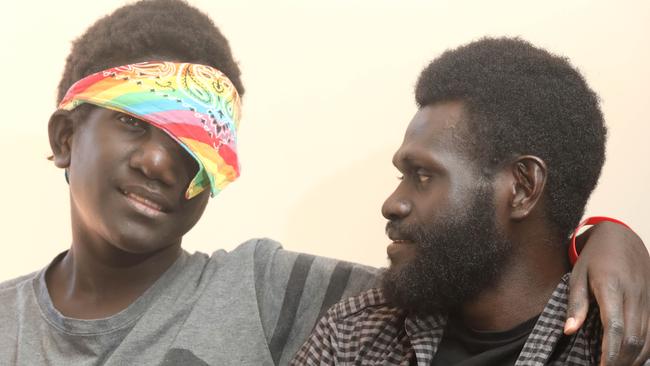
Dr Hasola was concerned that if left untreated Victor’s tumour would continue to grow and affect his other eye and possibly even invade his brain. He was also painfully aware that the complex surgery Victor needed could not be done in PNG.
He explained that he had tried to surgically remove the tumour nine years ago, but the small hospital where he worked had only basic equipment.
“The operation wasn’t successful as the hospital didn’t have the equipment or the capacity to do a biopsy before surgery,” Dr Hasola said. But he never gave up.
“I know … like me you believe every child has the right to surgery regardless of where they are born,” he penned in a heartfelt letter to the foundation.
Victor’s surgery was led by Mark Moore. The world renowned craniofacial and plastic surgeon said it took almost four hours and involved the craniofacial surgical team with anaesthetists and nurses.
Dr Moore is the medical unit head of Cleft and Craniofacial South Australia with the surgery carried out at Adelaide’s Women’s and Children’s Hospital.
On Thursday Victor and Isaac arrived in Melbourne where he says he will rest at The Retreat, a country haven also run by the charity, before the pair make the long journey home to excited family.
“His parents are very happy with the surgery and that he is coming home,” Isaac said.
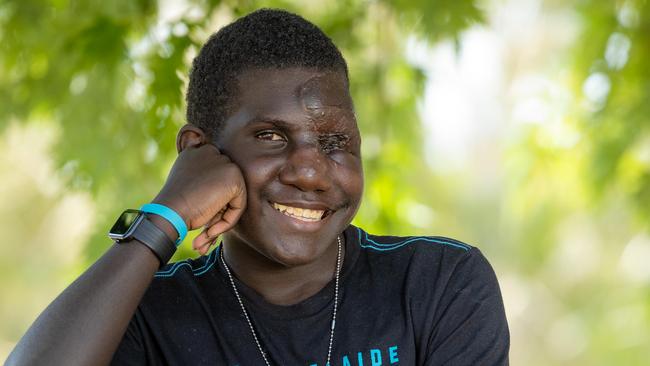
Dr Moore said Victor had a benign tumour called a lymphangioma involving his left forehead and eye socket.
“His surgery involved excision of this tumour with removal of his left, blind eye and resurfacing/filling in of his left eye socket,” Dr Moore said.
“The operation was a success; his healing of wounds has been pleasing.
“He will not have an artificial eye as the problems of infection and maintenance of the prosthesis in his home environment would be problematic.”
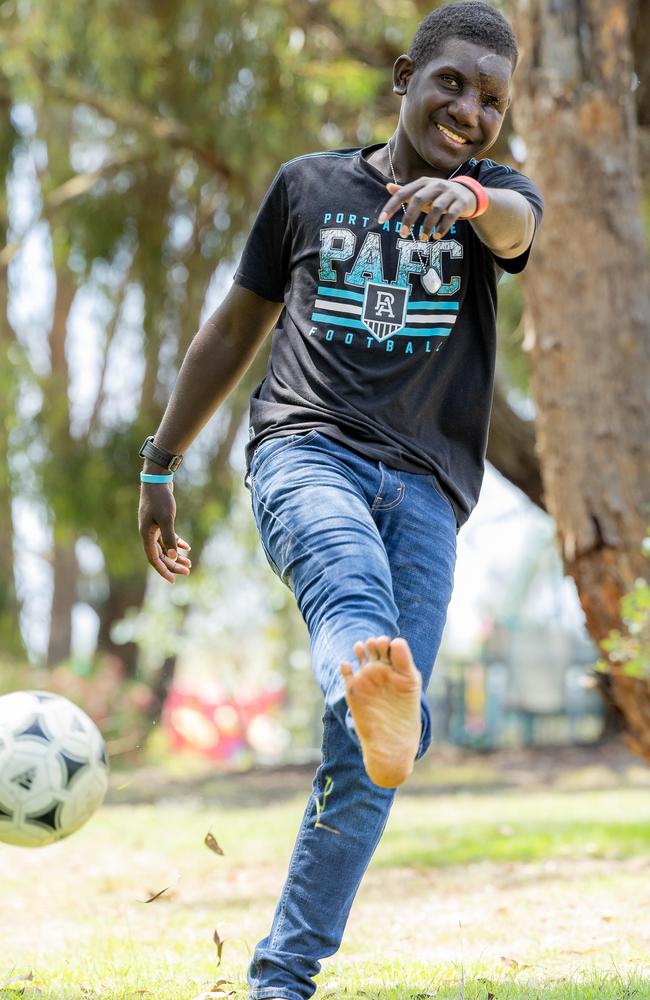
Dr Moore says no follow-up is needed before Victor returns to Bougainville, but that Children First’s partners would check on him and continue to monitor Victor until he is 18.
Victor says he is most looking forward to returning home and to school where in February he will start the equivalent of year 9 with hopes of playing soccer, perhaps even as a professional one day.
It is a long shot, he knows, but for Victor to even dare to have that dream is a miracle.
“My future is so much better,” he said.
For the medical professionals who gave him that future and to the Children First Foundation who helped to make it a reality, Victor says ever so softly: “thank you”.
For more information about its activities, visit childrenfirstfoundation.org.au
At a glance:
• Children First has helped hundreds of children from developing countries access quality surgery not available in their home country
• These surgeries include orthopaedic, craniofacial, neuro, burns and plastics, general, vascular, ENT and urology
• The charity receives no government funding and is funded through individual donors, corporations, trusts and foundations




